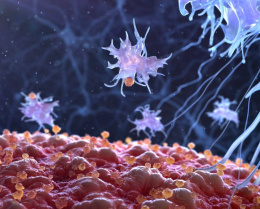Press Release
$5.2 million raised to accelerate work on Australian Covid-19 vaccine
MEDIA RELEASE August 2021 Australian biotechnology company Sementis Limited has raised more than $5.2 million to accelerate...

MEDIA RELEASE
November 2018
In an international collaboration between Sementis and Enesi Pharma, Sementis Ltd is partnering up with the experts in the field of Zika virus and chikungunya vaccine research at UniSA’s Experimental Therapeutics Laboratory at its Cancer Research Institute to evaluate a needle-free vaccination technology developed by Enesi Pharma for Sementis’ SCV-based vaccines.
In the next phase of a highly effective research and development partnership between Sementis Limited and the Experimental Therapeutics Laboratory, work has begun to deliver the single vectored chikungunya/Zika vaccine and the peanut hypoallergy vaccines in a new way, as solid dose implants, rather than traditional injections.
The implant development is being spearheaded by the Oxford-based Enesi Pharma, in the UK, using its proprietary ImplaVax® technology.
CSO and CEO of Sementis, Dr Paul Howley says he is delighted that Sementis is deepening its long standing and highly productive relationship with UniSA in bringing the ground-breaking technology to Sementis’ vaccine portfolio. In partnership with Enesi and UniSA, Enesi’s delivery mechanism ImplaVax® promises to bring yet another extremely important dimension to our vaccines.
UniSA expert in Zika virus infection and Advanced Queensland Research Fellow, Dr Natalie Prow, says the new delivery mode for the vaccine will have important advantages that will ensure greater global reach, especially to communities where diseases such as Zika and chikungunya are most prevalent.
“The greatest advantage of an implant vaccine delivery system is that there is better stability for the vaccine”, Dr Prow says.
“The vaccines can be more easily stockpiled for emergency use and there are cost savings in what is required to store the vaccine because in a solid format, it is not as susceptible to temperature fluctuations.”
UniSA researchers with colleagues at the QIMR Berghofer are the key players in the development of the single vectored combined Zika-chikungunya vaccine for Sementis and proof-of-concept studies in mice and non-human primates have demonstrated its effectiveness.
The UniSA team will also be working to develop the investigational therapeutic peanut allergy vaccine based on the same SCV vector platform developed for the Zika/chikungunya virus.
Lead researcher on the allergies program within the Experimental Therapeutics Laboratory, Dr Tamara Cooper, says the evaluation of Enesi’s technology with the SCV platform is going to be significant.
“It’s an exciting opportunity to add the benefits of the Enesi delivery system to Sementis’ SCV technology which could work together to make a successful vaccine for peanut allergy,” Dr Cooper says.
“We could change the lives and the health of millions of people around the world who suffer the life-threatening reactions to contact with peanuts.”
Head of the Experimental Therapeutics Laboratory, Professor John Hayball, says these ongoing R&D partnerships with industry help to advance human health on a global scale.
“Working across these research and development programs with our partners Sementis and now Enesi Pharma, gives us an amazing opportunity to provide solutions to problems in vaccine development and see new vaccines become a reality – ultimately, we know our work will save lives,” Prof Hayball says.